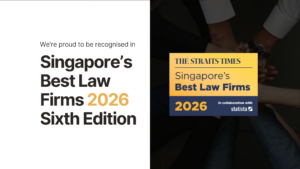In the volatile economic climate of 2025, where tariffs are rising, markets are fluctuating, and artificial intelligence is reshaping jobs faster than anticipated, companies are tightening their belts as never before. Singapore, long regarded as a resilient hub for global commerce, is not immune to these headwinds. Rising inflation, geopolitical uncertainties, technological disruption, and shifts in global supply chains have compelled businesses to reassess their workforce needs. Within this context, retrenchment, severance, and disputes related to employee misconduct have emerged as critical issues in employment law and industrial relations.
Employers today face heightened scrutiny from regulators, unions, and the public in ensuring that retrenchment exercises are conducted fairly, severance obligations are fulfilled, and allegations of misconduct are properly investigated—particularly in an era where hybrid and remote work arrangements complicate oversight. Employees, conversely, seek assurance that their rights are respected and that decisions taken under the banner of “business necessity” are not arbitrary or discriminatory.
This article explores retrenchment processes, severance obligations, misconduct investigations in hybrid contexts, and pathways for resolution, drawing on MOM’s Tripartite Advisory on Responsible Retrenchment and emerging case studies.
I. RETRENCHMENT
Retrenchment, often referred to as “layoffs” or “redundancies”, occurs when employment is terminated due to economic factors, technological changes, or business restructuring. This differs from dismissal for poor performance or misconduct.
In Singapore, retrenchment is not governed by a single statute. Instead, it is shaped by a combination of legislative instruments and tripartite advisory bodies. The key sources include:
- Employment Act 1968 – Establishes basic employment terms and protections.
- Tripartite Advisory on Managing Excess Manpower and Responsible Retrenchment (TAMEMRR) – Issued by the Ministry of Manpower (MOM), National Trades Union Congress (NTUC), and Singapore National Employers Federation (SNEF). While not legally binding, it outlines the responsible retrenchment practices that employers are expected to follow.
II. PRINCIPLES OF RESPONSIBLE RETRENCHMENT
Employers considering retrenchment are expected to adopt a long-term view of manpower needs, maintaining a strong Singaporean core, consulting unions where companies are unionised, and avoiding discriminatory selection practices.
Guiding principles include:
- Selection should be based on objective business needs and future contributions, rather than perceived disobedience or poor performance.
- Employees must be treated with dignity and respect.
- Where possible, employers should extend longer notice periods to allow employees more time to transition.
- Before retrenching, employers should explore job redeployment across projects or departments. Retrenchment cannot serve as a shortcut to remove unwanted employees.
- If the “last in, first out” (LIFO) principle is not observed, employers must justify alternative selection on grounds such as the distinctive skills required for business continuity.
- Foreign employees should generally be retrenched before local employees unless clear justification exists for departure from this practice.
Employer Obligations
In Singapore, certain obligations govern retrenchment exercises:
- Notice to Employees: The Employment Act does not confer a statutory right to retrenchment notice or payment in lieu of notice if the employment contract specifies otherwise. Nevertheless, employers are encouraged to provide adequate notice where possible.
- Notification to MOM: Employers with 10 or more employees must submit a Mandatory Retrenchment Notification to MOM within five working days of informing affected employees. Those with fewer employees are strongly encouraged, though not legally mandated, to provide notification.
- Payment of retrenchment benefits: Employees with at least two years of service are entitled to retrenchment benefits. While the quantum varies depending on contracts, collective agreements, or negotiations, the prevailing norm is between two weeks to one month of salary per year of service. In unionised companies, the expectation is one month’s salary per year of service. Employees with less than two years’ service may receive an ex-gratia payment at the employer’s discretion.
- Final settlement: Employers must settle all salaries, including unused annual leave and notice pay, on the employee’s last day of work.
- Support for re-employment: Responsible employers should assist redundant employees through outplacement support or career transition services.
III. RECENT CASE STUDIES
Agoda Investigation
Employers should not include gag clauses in severance agreements. Agoda’s severance package reportedly contained clauses warning employees against contacting the Ministry of Manpower (MOM) or unions, threatening forfeiture of payouts. MOM has launched an investigation, while NTUC and the Singapore Industrial and Services Employees’ Union (SISEU) condemned the practice as a violation of worker rights.
Lazada Retrenchment Controversy
Lazada recently retrenched 100 employees, prompting the National Trades Union Congress (NTUC) in Singapore to issue a statement expressing “deep disappointment” about the retrenchment exercise. The exercise was carried out without prior consultation with the Food, Drinks and Allied Workers Union (FDAWU), despite the Singapore-headquartered firm being unionised under FDAWU.
The FDAWU is currently negotiating with Lazada for improved benefits for laid-off employees, who were initially informed that they would receive only two weeks’ salary for every year of service. The retrenched staff are also bound by a 12-month non-compete clause covering an extensive list of technology, retail, and logistics companies, including Grab, TikTok, and Amazon.
IV. EMPLOYEE MISCONDUCT IN HYBRID AND REMOTE WORK ENVIRONMENTS
Beyond retrenchment, employers must manage misconduct risks in remote and hybrid work environments. Misconduct may range from policy breaches to serious offences such as fraud or theft. Under the Employment Act, dismissal for misconduct is only valid if preceded by a due inquiry—a fair, impartial investigation into the allegations.
Failure to conduct a proper inquiry renders the dismissal wrongful, even if misconduct occurred. MOM’s Code of Responsible Employment Practices emphasises that investigations must be prompt, impartial, and confidential, with employees given the opportunity to respond.
V. ADAPTING INVESTIGATIONS TO REMOTE WORK
Hybrid and remote work settings pose new challenges for misconduct investigations. Employers must adapt protocols to safeguard fairness and compliance:
- Evidence Collection and Chain of Custody: Misuse of company resources or breaches of data security often leave digital trails. Employers should engage forensic IT experts to conduct remote data collection from devices or cloud systems, ensuring compliance with data privacy laws such as the Personal Data Protection Act (PDPA).
- Remote Interviews: Disciplinary interviews should be conducted via secure video conferencing, with confidentiality safeguards. Interviewees should confirm they are in a private setting, free of smart devices that could inadvertently record discussions. Recording requires explicit consent from all parties.
- Managing System Access: Employees under investigation may have system access suspended to protect sensitive data. However, communication channels must remain open so that the employee can participate in the inquiry process. Cutting off communication prematurely risks being seen as prejudgment.
VI. POLICY UPDATES FOR THE MODERN WORKPLACE
A robust, up-to-date workplace policy is the foundation of effective disciplinary action in hybrid settings. Employers should review policies to clearly define misconduct in remote contexts, addressing:
- Appropriate use of communication platforms (e.g., Slack, Microsoft Teams).
- Data security and handling of confidential information outside the office.
- Expectations for work hours and monitoring in remote settings.
VII. CONCLUSION
The economic turbulence of 2025 has tested the resilience and values of organisations in Singapore. While retrenchment and disciplinary action may sometimes be unavoidable, the way these processes are handled reflects an organisation’s integrity.
Compliance with legal obligations—such as mandatory notifications, severance payments, and due inquiry requirements—is only the starting point. Employers must also embrace the spirit of the tripartite framework: treating employees with dignity, ensuring procedural fairness, and using retrenchment only as a genuine last resort.
In Singapore’s tight labour market, maintaining a reputation for fairness is a long-term strategic asset that will ultimately determine a company’s ability to thrive when economic winds shift in its favour.
Please note that this article does not constitute express or implied legal advice, whether in whole or in part. For more information, email us at info@silvesterlegal.com







